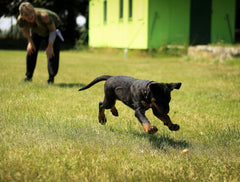
Fat cats are irresistibly adorable, but unfortunately, all of that extra weight is not good for their health. This is why it’s important to understand how much you should be feeding your cat, how often, and what changes should be made to their diet as they grow older. There is an “ideal” cat weight that your cat should weigh in order to be healthy.
If they are too far above or below this weight, you will have to pay even closer attention to how much and how often they eat. A cat eating is better than a cat that is not eating, but on that same note, it's important to know if they are overeating. Feeding your cat right can also improve their longevity.
What Kind of Food Should My Cat Eat?

There are advantages to both wet food and dry food for your cat. It's important to be aware of and understand these pros and cons before deciding on a diet for your feline. For instance, when it comes to dry food most cats like to eat it and it's good for their dental health.
On the downside of things, dry food lacks water to help keep your cat hydrated and help their kidneys to function properly. Depending on the kind you get, some dry cat food is high in carbohydrates and low in protein. Which can be unhelpful if you need your cat to lose weight.
Wet cat food is typically preferred by most cats, whether because of the flavor or just by preference. Other pros of wet cat food include that it has water in it which supports your cat’s hydration levels. Wet cat food is also easier to hide pills or supplements in if you need to give your cat something with their meal.
However, wet cat food tends to be the more expensive option, especially if they are picky and you need to buy a specific brand or flavor. Wet cat food can also be detrimental to your cat’s teeth over time, as it can stick to their teeth and can lead to dental problems. If you're unsure which wet or dry food to get, you can ask your vet for some of the best vet-recommended cat food options in the market.
How Much and How Often Should My Cat Eat?

The amount of food that you should feed your cat depends on a few factors that should be considered. These factors include your cat’s age, weight, and activity levels. Your cat's age should be considered because a young kitten will need more food over the course of the day than an older cat due to the fact that they are still growing and so incredibly active. Many professionals will say that a kitten should be eating at least 3 meals per day and these meals should include both wet and soft food generally.
As cats grow older, they become less active and tend to lay around and sleep more throughout the day. Meaning, they are at higher risk of gaining weight and becoming obese. Nutritional needs also change as a cat grows older.
They don’t need as much protein or carbohydrates as a young, actively growing kitten might each day. On average, an adult cat should be getting around 200 calories of food per day to maintain an ideal weight and nutritional balance.
For cats of all ages, their natural instinct is to graze and nibble on food throughout the day. This is where dry food comes in handy because it's a kind of food you can leave out all day for your cat to pick on while you're away or at work. This can be problematic however if you have two cats and one is on a special diet and they cannot share food. You may have to consider separate feeding areas or feeding times if that’s the case.
How Much Should My Cat Weigh?

On average, a full-grown domestic cat should weigh somewhere around 10 pounds. This can vary from one breed to the next, as some cats are built larger or much fluffier than others, and this can have an effect on their weight.
Since their ideal weight can vary from one cat to the next, there are important signs to pick up on that can tell you whether your cat is a healthy weight or not. One of the more relied upon methods is just feeling your cat. If you can feel their ribs but cannot see them, they are very likely at a healthy weight for them.
Conclusion
Choosing the right diet plan for your cat is a task that should be taken very seriously. The diet of your cat will have a huge impact on your cat’s overall health and quality of life. A kitten will need to eat a well-balanced meal at least 2-3 times per day for their first year of life while they are so active and growing rapidly.
After that first year, their diet will change to suit the various stages in their life. If you continue to feed your adult cat like you might a kitten, they will probably become overweight and unhealthy. These are only a few of the more important things to keep in mind about how you should be feeding your cat.




